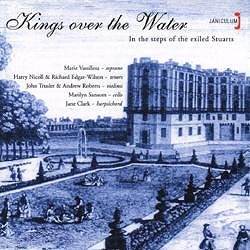
Crotchet £10.95 |
KINGS OVER THE WATER
- In the steps of the exiled Stuarts Instrumental and vocal music from the early 18th Century by; Innocenzo FEDE (dates unknown), Alessandro SCARLATTI (1660-1725), Alessandro STRADELLA (1644-1687), Tomaso VITALI (1663-1645), Henry DESMARETS(1661-1741), Jean Baptiste LULLY(1632-1687), ALBINONI (1671-1751), VIVALDI (1678-1741) Francesco FEO (1691-1761) and Gioacchino COCCHI (1720-1804) |
This is the fifth disc produced by this small company who are aiming to concentrate their efforts on the little known Italian music of the early 18th Century. This disc certainly does that with most of the music never before recorded and some of the composers completely new to me and the catalogue.
I can't say that I have ever really considered the fate of James II after he was removed from office in 1688, and if I had I certainly would not have thought about his importance to the music of the period. Well this disc proves me to have singularly uninquisitive.
James was a Roman Catholic and as such posed a threat to peace in England. He was best placed in France and later Italy where he went into exile to Saint-Germain-en-Lay. Later, in 1714, he moved to Urbino. In 1719 he found himself in Rome where he died. He was therefore exposed to and enjoyed Scottish, English, French and Italian culture of this period and could afford to commission and foster composers. James II's son, who would have been James III (otherwise known as the 'Old Pretender') continued where his father left off and resided in Paris. He had a modern taste in music favouring the French tuneful style of Lully and Desmarets.
James II took into exile pieces from the collection known as 'The Dancing Master' from which two of the items come. He also took his 'maestro di capella' Innocenzo Fede and his court became an important centre of Italian music and a great influence in France. The booklet notes by Jane Clark the harpsichordist say that this was "probably responsible for the 'goûts-réunis' style of Francois Couperin". It was he who tried to bring two distinctly different styles under one umbrella.
If we were being a little harsh we might describe Vitali, Fede and possibly Albinoni as second-raters, but the works represented here demonstrate perfectly the kind of popular taste amongst the aristocracy and the burgeoning middle classes at that time. Vitali's five movement Trio in B minor is in the 'goûts-réunis' style, with its Sarabande, Allemanda and a very French Rondon, and a good piece it seems to be. Fede's instrumental music is too short-winded to make its point strongly, but Vivaldi's Trio in C minor is vintage and Desmarets dances from his 'Les Festes Galantes' are very attractive.
From later in the century come the lengthier da capo arias of Cocchi and Feo. The former is a beautiful piece and quite a favourite of the Royals from an otherwise forgotten opera 'Andromaca'. Apparently it was often asked for as an encore item in Rome where the Stuarts had the privilege of being able to request them at the opera. This one (by Cocchi) is dedicated to Prince Charles Edward.
On the back of the booklet we are told that the instruments used are "either 18th Century originals or modern copies". The playing style too, makes every effort to conform to present day thinking and delightful it all is. However I cannot be so enthusiastic about some of the singers. Sometimes they are too ponderous in delivery, lacking in vocal colour and using I feel too much vibrato more suitable for 19th Century opera where a larger ensemble accompanies. This problem is felt particularly with the soprano Marie Vassiliou. Surely Albinoni's aria 'Mi son per te mio bene' would benefit from a faster tempo and a lighter touch, likewise the delightful aria by Cocchi mentioned earlier. Perhaps also a greater dynamic contrast is needed. And what about ornamentation for the da capo repeats?
The booklet is adorned I think, although it doesn't indicate, with an unattributed original picture of Versailles. The very interesting essay is translated into French but only one other item, the civil war song 'The King shall enjoy his own'.
The Italian arias are sometimes given a most cursory translation underneath the text and later in the booklet they are clearly translated down the side of the original text, a much happier arrangement. It is only in these arias that the translator is credited. The French arias are adequately translated underneath the original.
An interesting and enterprising CD including much music which has not been heard for almost 300 years, and throwing light onto a little known area of European music and society.
Gary Higginson
AVAILABILITY
Available from: Janiculum Recordings, 4, Scarth Rd., London SW 13 OND
Fax 02008395 3919
E-mail janeclark@intune.co.uk www.janiculum.co.uk